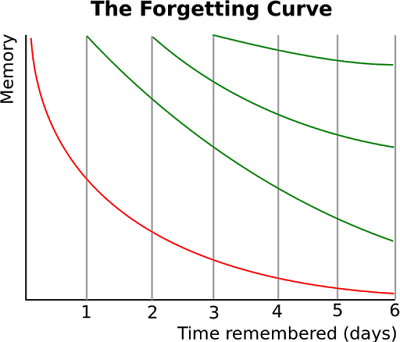Spaced learning and problem solving
There have been many
instances in my life where I learned something only to forget it sometime
later. Two things that come to mind are Calculus and operating the back end of
Moodle (an LMS very popular in Australia, India and the UK). I do not think
much about Calculus as I am sure I would not have made it anywhere as a
mathematician anyway but forgetting how to operate certain things in Moodle is
something that haunts me every single day.
The reason why I forgot
how to operate Moodle is because I did not use it for a couple of years. During
these years I entered what is called as a ‘forgetting curve’. This was a term
first used by Hermann Ebbinghaus in the late 1880s. This essentially means that
any information in our memory not used for a certain period starts to decay.
The rate of decay may be different for different pieces and types of information,
but it does affect every piece of information.
So, what is the
relevance of this forgetting curve you ask. The relevance is that if we are
aware of this forgetting curve then we can plan our learning/training strategy around
it and keep reinforcing the learning in a spaced manner. This is especially
true of performance that needs to be repeated certain times of the year or
during certain events. Spaced learning does not mean that we need to subject
the learner to the same learning program again and again, instead, we reinforce
the learning with learning support tools such as job aids or refreshers.
The second benefit of
spaced learning is that it helps with learning incubation and problem solving.
How might that be you
ask.
Well put it this way,
we all have had instances where we have tried learning something – a new
software, a process, recipe and it just did not work very well on the first go.
The reason behind it is that our brain needs time to process and organise
information, especially when it comes across information for the very first
time.
This is the
information incubation time.
During this incubation
time our brain organises information in manner that makes sense. After this
organising has been done and we have a reason to revisit the learning
(refresher, job aid) then the newly organised information comes into play and
we are suddenly able to develop some insights that we were unable to earlier.
Moral of the story is if you are trying to solve a problem and are not able to make much progress then leave the problem and do not think about it. This will give your brain the time to incubate and arrange the pieces of information in a way that will make more sense to you later. Once the brain does this process you will be able to derive a solution once you look at the information again and wonder where that solution came from.
Moral of the story is if you are trying to solve a problem and are not able to make much progress then leave the problem and do not think about it. This will give your brain the time to incubate and arrange the pieces of information in a way that will make more sense to you later. Once the brain does this process you will be able to derive a solution once you look at the information again and wonder where that solution came from.

Comments
Post a Comment